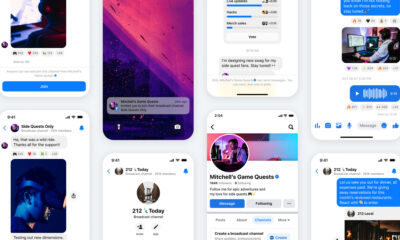News
Facebook Will Create 10,000 Jobs In The EU To Build Its Metaverse
Facebook decided to invest in the EU because the company believes that European talent is world-leading, supported by first-class universities.

Facebook has announced that it wants to create 10,000 jobs in the European Union (EU) to build its metaverse, a virtual reality space in which users can interact with a computer-generated environment and other users.
The concept of the metaverse can be traced to Neal Stephenson’s 1992 cyberpunk novel Snow Crash. In the novel, the metaverse is a virtual shared space that appears to its users as an urban environment. This space is accessed through personal terminals connected to virtual reality goggles.
Sound familiar? That’s because the metaverse is quickly becoming a reality thanks to companies like Oculus, a subsidiary of Facebook, and the combined effort of developers and content creators from around the world.
By creating thousands of new high-skilled jobs within the EU over the next five years, Facebook wants to accelerate the development of the metaverse to usher in a new phase of interconnected virtual experiences, enabled by technologies like virtual and augmented reality.
“At its heart is the idea that by creating a greater sense of ‘virtual presence,’ interacting online can become much closer to the experience of interacting in person,” said Nick Clegg, Facebook’s vice-president of global affairs. “The metaverse has the potential to help unlock access to new creative, social and economic opportunities”.
According to the official announcement, Facebook decided to invest in the EU because the company believes that European talent is world-leading, supported by first-class universities. Facebook also mentioned the role European policymakers are playing in shaping the internet, so it’s likely that the investment has a political dimension to it.
Also Read: How To Lock Your Facebook Profile (From Mobile & Desktop)
Aware of its tarnished reputation, the social media giant stressed that no single company would own and operate the metaverse — just like no single company owns the internet today. Of course, that doesn’t change anything about the fact that Facebook wants to play a huge role in it.
Earlier this year, Mark Zuckerberg told his employees that Facebook is becoming a metaverse company with the goal of building a set of connected social apps and supporting hardware. The recently released Horizon Workrooms remote collaboration app for the Oculus Quest 2 headset can be seen as an early piece of the much larger puzzle the metaverse will become in the future.
News
Rabbit Expands Hyperlocal Delivery Service In Saudi Arabia
The e-commerce startup is aiming to tap into the Kingdom’s underdeveloped e-grocery sector with a tech-first, locally rooted strategy.

Rabbit, an Egyptian-born hyperlocal e-commerce startup, is expanding into the Saudi Arabian market, setting its sights on delivering 20 million items across major cities by 2026.
The company, founded in 2021, is already operational in the Kingdom, with its regional headquarters now open in Riyadh and an established network of strategically located fulfillment centers — commonly known as “dark stores” — across the capital.
The timing is strategic: Saudi Arabia’s online grocery transactions currently sit at 1.3%, notably behind the UAE (5.3%) and the United States (4.8%). With the Kingdom’s food and grocery market estimated at $60 billion, even a modest increase in online adoption could create a multi-billion-dollar opportunity.
Rabbit also sees a clear alignment between its business goals and Saudi Arabia’s Vision 2030, which aims to boost retail sector innovation, support small and medium-sized enterprises, attract foreign investment, and develop a robust digital economy.
The company’s e-commerce model is based on speed and efficiency. Delivery of anything from groceries and snacks to cosmetics and household staples is promised in 20 minutes or less, facilitated by a tightly optimized logistics system — a crucial component in a sector where profit margins and delivery expectations are razor-thin.
Despite the challenges, Rabbit has already found its stride in Egypt. In just over three years, the app has been used by 1.4 million customers to deliver more than 40 million items. Revenue has surged, growing more than eightfold in the past two years alone.
Also Read: Top E-Commerce Websites In The Middle East In 2025
CEO and Co-Founder Ahmad Yousry commented: “We are delighted to announce Rabbit’s expansion into the Kingdom. We pride ourselves on being a hyperlocal company, bringing our bleeding-edge tech and experience to transform the grocery shopping experience for Saudi households, and delivering the best products – especially local favorites, in just 20 minutes”.
The company’s growth strategy avoids the pitfalls of over-reliance on aggressive discounting. Instead, Rabbit leans on operational efficiency, customer retention, and smart scaling. The approach is paying off, having already attracted major investment from the likes of Lorax Capital Partners, Global Ventures, Raed Ventures, and Beltone Venture Capital, alongside earlier investors such as Global Founders Capital, Goodwater Capital, and Hub71.


























